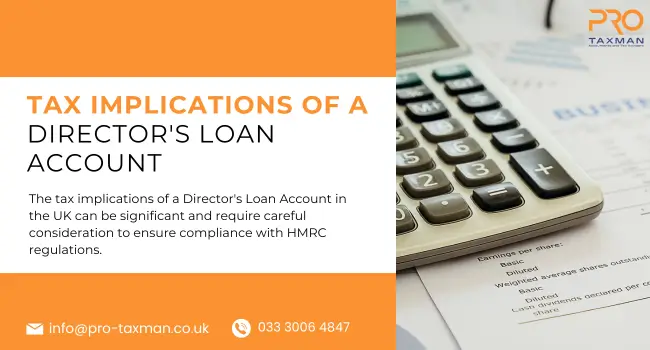The tax implications of a Director’s Loan Account in the UK can be significant and require careful consideration to ensure compliance with HM Revenue and Customs regulations. The Director’s Loan Accounts (DLAs) have several tax implications for both the director and the company:
1. Benefit in Kind Tax:
If the DLA is overdrawn (i.e., the director owes money to the company), HM Revenue and Customs (HMRC) may treat the outstanding balance as a benefit provided by the company to the director. The director would then be liable to pay tax on this benefit at their marginal income tax rate, typically through their self-assessment tax return.
2. Section 455 Tax:
If the DLA is overdrawn at the end of the company’s accounting period and remains unpaid nine months and one day after the end of that period, the company may be liable to pay Corporation Tax under Section 455 of the Corporation Tax Act 2010. This tax is initially levied at 32.5% of the outstanding loan balance and is repayable to the company once the loan is repaid by the director.
3. Corporation Tax Deduction:
If the DLA is in credit (i.e., the company owes money to the director), any interest paid by the company to the director on the loan may be deductible for Corporation Tax purposes, provided it is at a commercial rate.
4. Implications on Dividends:
If the director’s loan is repaid using company profits that would otherwise be distributed as dividends, there may be implications for the taxation of those dividends. For example, if the repayment reduces the amount available for dividends, shareholders may receive less in dividends, potentially affecting their personal tax liabilities.
5. Interest on Loans:
If the director’s loan is interest-bearing, the interest charged should be at a commercial rate. Charging below-market interest rates may attract scrutiny from HMRC and could result in tax implications for both the company and the director.
6. Documentation and Record-Keeping:
Proper documentation and record-keeping are required to indicate that the director’s loan transactions are at arm’s length and in compliance with HMRC laws. This includes keeping records of the loan agreement, payments, interest charges (if applicable), and any other relevant documents.
It’s important for both the company and the director to seek professional advice from accountants or tax advisors to ensure compliance with HMRC regulations and to understand the specific tax implications of director’s loans in their particular circumstances.

